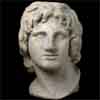Events relating to greece
The citizens of Olynthus abandon their houses, with elaborate mosaic floors, when their city is attacked by Philip of Macedon
Aristotle is employed in Macedon as tutor to the 13-year-old heir to the throne, Alexander
Hephaestion, Alexander's closest lifelong friend, may have been among the small group taught by Aristotle
Homer's Iliad becomes a profound source of inspiration to Alexander, who will keep scrolls of the text in his tent during his conquests

The theatre at Epidaurus is the earliest and best surviving example of a classical Greek stage and auditorium
Alexander the Great, at the age of sixteen, conducts his first successful military campaign – against the Thracians
The Macedonians develop the catapult as a siege engine for the armies of Philip II and Alexander the Great
Philip of Macedon defeats Athens and Thebes at Chaeronaea, giving him control of Greece
Philip of Macedon persuades most of the Greek city-states, brought together in Corinth, to agree to a military alliance with himself as leader
The League of Corinth resolves to launch a war against Persia, with Philip II in command of the confederate forces
An advance guard of 10,000 troops sets off towards Persia in the spring, with Philip due to follow later with the main army
At a summer feast to celebrate the wedding of his daughter, Philip of Macedon is murdered by one of his courtiers
The League of Corinth elects Alexander to take his father's place as leader of the campaign against Persia
Before departing for the east, Alexander destroys Thebes and enslaves the Thebans for rebelling against the League of Corinth
The 21-year-old Alexander the Great marches east with some 5000 cavalry and 30,000 footsoldiers

Indulging in a moment of romantic tourism, Alexander visits Troy at the start of his Persian campaign
Alexander, recreating a classic Greek ceremony, runs naked in Troy to the supposed tomb of Achilles to place a garland
Alexander is presented in Troy with a shield, said to have been dedicated by Athena to the Trojans, which will always accompany him into battle
Alexander moves south through Syria and Palestine, excluding the Persian fleet from their familiar harbours
Alexander the Great's army arrives in Egypt and the Persian governor of the province rapidly surrenders

While in Egypt, Alexander founds Alexandria – the best known of the many towns he establishes to spread Greek culture
Aristotle tackles wide-ranging subjects on a systematic basis, leaving to his successors an encyclopedia of contemporary thought
As a conclusive end to the long rivalry between Greece and Persia, Alexander destroys the great palace of Xerxes at Persepolis
Alexander takes a major new step, leaving Persian territory and moving through the mountain passes into India
In the Indian monsoon Alexander's Greek troops have finally had enough and threaten to mutiny unless he turns for home








